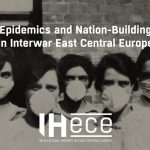 Central European University in Vienna (Web)
Central European University in Vienna (Web)
Time: 17.04.2021, 11-17.00 Uhr
Venue: virtual space, via Vienna
Zoom: Link
The outbreak of the Covid-19 pandemic prompted a quest for historical parallels that help us contextualize this traumatic event. The voices of historians, sociologists, and philosophers of science are vital in this debate. The event, consisting of an expert panel and a seminar, focuses on the experience of interwar East Central Europe to explore these historical parallels.
Expert panel (11:00-13:00)
The expert panel brings together scholars working on various contexts and issues connected to biopolitics in East Central Europe. Their presentations will be followed by a discussion, moderated by Professor Jakob Vogel of the Centre Marc Bloch and Humboldt-Universität in Berlin.
The program of the presentations is as follows:
- Ana Cergol Paradiž (Ljubljana): Psychiatry and Biopolitics in Slovenia
- Calin Cotoi (Bucharest): Cholera and Nation-Building in XIXth Century Romania
- Friederike Kind-Kovacs (Dresden): Rescuing the Future of the Nation: Childhood, Hunger and the Spanish Flu in Budapest after the Great War
- Martin Kuhar (Zagreb): Social Diseases, Social Therapy: Public Health and National Regeneration in Interwar Yugoslavia
- Victoria Shmidt (Graz): Health Films for Interwar “Periphery”: Between Adapting the Global Order and Building National Authenticity
Seminar (15:00-17:00)
Based on the proposed list of readings, seminar discussion will explore the following topics:
1. Epidemics and nation-building
After the collapse of the continental empires in the aftermath of the Great War, East Central Europe faced a double challenge of taming epidemics and nation-building. There is an emerging body of literature that discusses the process of post-imperial transitions in East Central Europe and the continuities between the interwar states and the continental empires that preceded them. Through the prism of epidemics control, we will explore whether and how biopolitical issues fit into these narratives. Drawing on the concept of biopolitics, our seminar will thus rethink some aspects of the process of nation-building in the region.
2. Expertise and its credibility
Sociologists and historians of science have long discussed various forms of expertise, and studied the strategies that helped them gain credibility. Drawing on these debates, we will explore the production and social uses of biopolitical knowledge in interwar East Central Europe. Who claimed expertise on biopolitical issues, and on what grounds? What audiences they sought to address? Finally, how did they win – or fail to win – trust in polarized societies?
3. Epidemics in the margins
Interwar East Central Europe was a diverse space. Its multiethnic and yet nationalizing states pursued policies that sought to render their populace legible. Our seminar, therefore, will discuss what impact these policies had on the internal peripheries of these states. How did they represent the ethnocultural diversity of these spaces, and various racial, gender and class identities? How were these policies negotiated on the ground? Did they interact with other, local forms of knowledge, or did they marginalize it? How did these policies shape subjectivities in these areas?
4. Global entanglements
Recently, historians in East Central Europe turned towards the global, and started exploring imperial and colonial entanglements of their region. Drawing on this fascinating research, we discuss how the concept of circulation of knowledge complicates the narrative about biopolitics in interwar East Central Europe. What transnational, (post-)imperial, and colonial knowledge about diseases and their control circulated in the region, and how was it appropriated? Who were the key transnational actors that facilitated the move of ideas, practices and people? What role did East Central Europe play in shaping discourses and practices on biopolitics on a global scale?
The event is organized by the research network “Intellectual History in East Central Europe,” a collective of advanced doctoral students at Central European University and partner institutions. The network promotes in the ECE area the research on intellectual history that goes beyond national canons.
For the research network: Lucija Balikic and Vojtech Pojar
Source: Facebook
